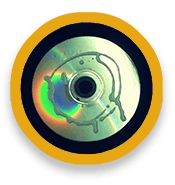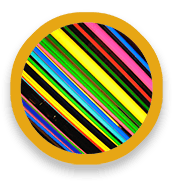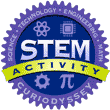SCIENCE EXPERIMENTS FOR KIDS
EXPLORE COLOR WITH A BENHAM’S DISK
Take those old CDs for a spin with this fun science project
Wondering what to do with all of your old Nickelback CDs, taking up space in your closet along with your neon workout gear? Here’s a great way to turn those old sound relics into a fun visual project for your kids.
Using old CDs and some common household items like marbles and bottle caps, you and your kids can explore how your eyes and brains perceive color by applying the Benham’s disk black and white pattern to a spinning disk. While you’re admiring your creation, put on some dowloaded music and have a dance party. Now’s a great time to put on that old neon unitard, too.
GATHER THIS:
- CD
- Benham’s disk pattern (included below)
- Marble
- A small bottle cap (or other object to make handle)
- Hot glue
- Glue sticks
- Scissors
THEN DO THIS:
- Cut out the Benham’s Disk Pattern and glue it to the top of a CD.
- Use hot glue to secure the marble in the bottom of the CD hole.
- Hot glue the bottle cap to the top of the CD, covering the marble.
- Spin the top and observe it carefully. Colors may appear in arcs at different distances from the center of the CD.
ASK THIS:
- What colors do you see? (People see different colors.)
- What happens if you spin the top the opposite way?
- What happens as the disk slows?
- What happens if you draw on the disk or change the disk pattern?
WHAT IS HAPPENING?
Your eyes have color receptive nerve cells called cones and there are cones for detecting red, green and blue light. Each type of receptor takes a slightly different amount of time to signal to your brain. White light activates all three cones. and the flashing while light causes the cones to turn on and off rapidly. This rapid switching exacerbates the difference in signaling times and your brain interprets the information as seeing color.
WHAT THIS TEACHES:
Skills: Scientific process, fine motor skills, observation skills
Themes: Light and color, perception
Join the CuriOdyssey Community
LOCATION
1651 Coyote Point Drive
San Mateo, CA 94401
Ohlone Land Acknowledgement
650-342-7755
info@curiodyssey.org
CuriOdyssey is a 501(c)(3) non-profit, Tax ID 94-1262434




